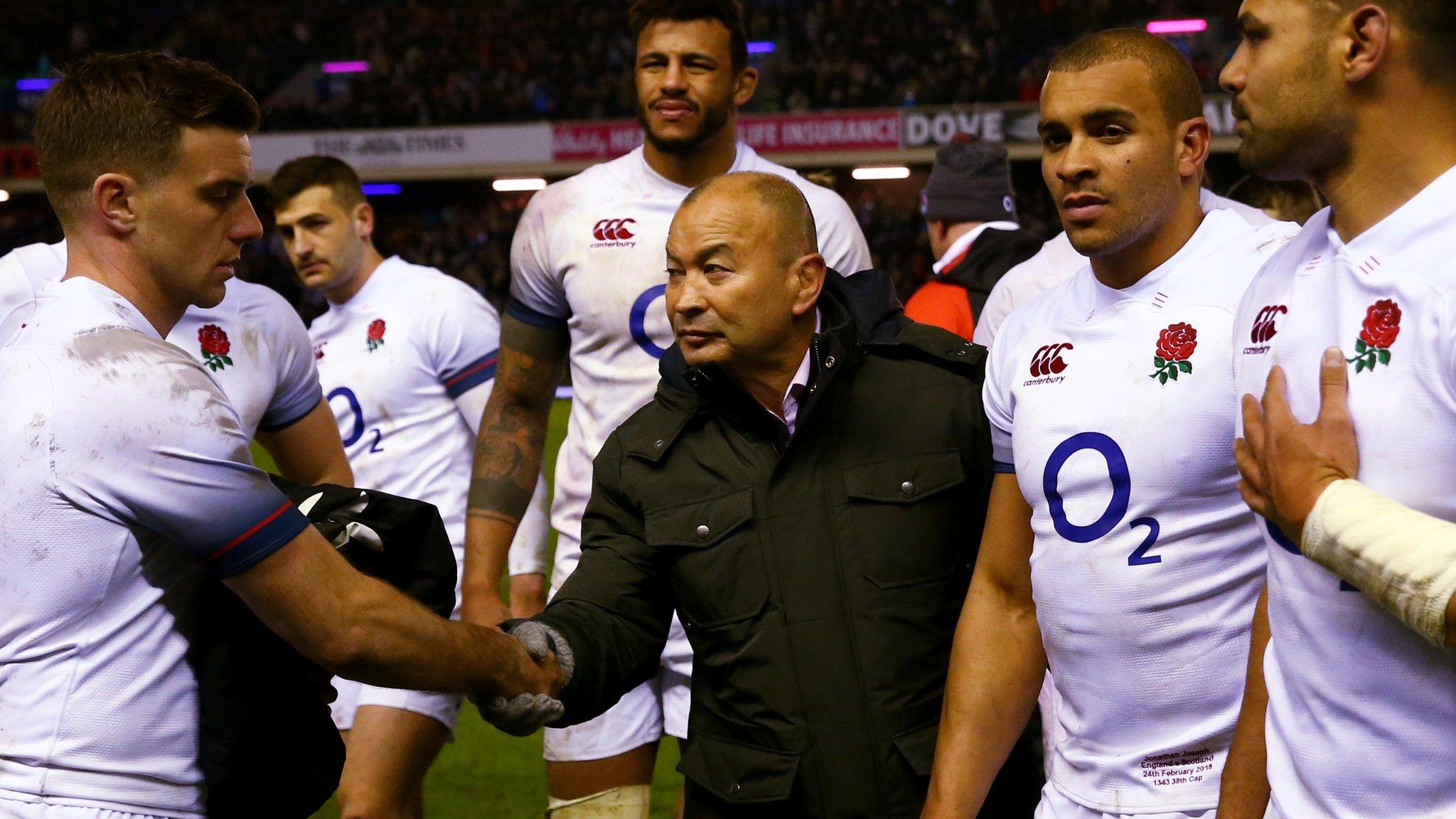Six Nations: Scotland 'shook up world rugby' against England - can they do it again?
- Published
- comments
Six Nations: Scotland 25-13 England highlights
You could spend the day picking out little moments and big moments that encapsulated what went on at Murrayfield on Saturday. In the mind's eye there's dozens of them.
Sixty-one seconds either side of the half-hour mark was the whole thing in microcosm, though. Scotland's ruthlessness in defence and brilliance in attack, England's vulnerability and England's defeat.
What had just gone on? Scotland have overthrown at a line-out and Chris Robshaw had gobbled it up. George Ford had taken England into the 22 and on other days you'd have bet the house that they were going to come away with points, possibly three, possibly five, possibly seven. The England way as we have known it under Eddie Jones.
What happened next? John Barclay won the breakdown. The Scotland captain won many breakdowns. Barclay, Hamish Watson, Ryan Wilson and the entire Scotland wrecking crew won a landslide victory on the floor and it was the beginning, the end and the in-between of this epic contest.
England, seeking momentum, got turned over six times in Scotland's 22 and Barclay was responsible for three of them. Has he ever played a better game? Doubtful. But, then, you could say that of many of these Scotland men.
From that first turnover penalty, Scotland tapped and went. Having seen Scotland's aggression we now saw Scotland's ambition - and it was stunning.
Finn Russell, magnificently unflappable in the face of such criticism, floated a delightful skip pass over the head of Jonathan Joseph and into the grateful mitts of Huw Jones. Did he worry about the intercept? "Nah, I knew what was happening," he smiled.
Jones ate up road. When he got hauled down by Jonny May, Scotland were at England's 22 and England were panicking. Wilson played scrum-half, linking with Barclay. Forwards becoming backs and backs becoming forwards. Stuart McInally applied the turbo boost to get through Owen Farrell, Russell applied the coup de grace with another precise pass to Sean Maitland for a score that will live long in the memory.
Sixty-one seconds from the moment Barclay won that penalty to the moment Maitland touched down at the other end. As the old saying goes, 'If the All Blacks did that…'
Barclay doesn't do superstition, which is just as well, because the signs weren't good leading up to Saturday. There was the earthquake for a start. Yes, the earthquake. Last weekend; 4.4 on the Richter Scale, enough to make the walls of his house in Mumbles on the western edge of Swansea Bay shake for 10 scary seconds.
Then, there was the chicken pox. Oh, yes. That was a beauty. He had it all planned, you see. Hayley, his wife, was coming to Edinburgh with their three boys, Finn, Logan and little Max, only seven weeks old. Finn and Logan are young veterans of international rugby, but Saturday was to be Max's debut. The Calcutta Cup was to be the first time that Barclay had his three sons watching him captaining his country. "It's going to be a special moment," he said, early last week. "Max won't know what's happening, but it'll be brilliant knowing that they're all there."
Barclay wouldn't say it out loud, but he had an inner confidence about Saturday that few outside the Scotland team circle would have shared.
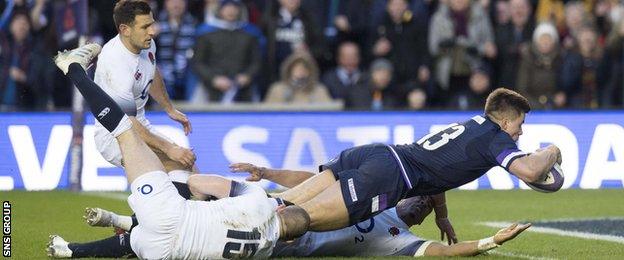
Scotland centre Huw Jones crashes through to score his second try of the game
He thought they could win the battle of the breakdown and if you win the breakdown then you're taking a big step towards winning the match. He thought that the Scotland back row were quicker and more dynamic than the hulking English three. He thought they might have an edge. One thing thinking it and another thing proving it.
Barclay had no intention of shooting his mouth off. He'd been burned by England, and others, too many times for that.
The Barclay household woke up in tumult midweek. Finn was covered in spots - and it was catching. Chicken pox arrived and the prospect of a family day out at Murrayfield evaporated. Hayley and his boys watched the Calcutta Cup from the sofa. Maybe it was for the best. The noise inside Murrayfield? It might have scared the wits out of baby Max.
This was a day when those statistic books that were so damning of Scotland were rewritten minute by minute. After 15 minutes Scotland scored their first home try against England in 14 years. After 31 minutes Scotland had scored as many tries against England at Murrayfield as they had in the previous 18 years. After 40 minutes Scotland had their biggest half-time led against England in 147 years.
The try that gave them that 22-6 lead was Jones' second. History repeated in the try-scorer and history repeated in the man who won the ball back to give the try-scorer his chance. We're talking about Barclay again.
Robshaw had taken England into Scotland's 22, but Scotland were too quick in thought and deed to allow them to progress them any further. They were routed at the breakdown again.

Scotland captain John Barclay turned in a hugely impressive display at Murrayfield
Once Simon Berghan and Jonny Gray had made the hit on Robshaw, Barclay descended like a lone horseman of the apocalypse. He swooped and latched himself on to the ball on the floor. Joe Launchbury came firing in to shift him but he wouldn't have moved the Scotland captain out there had he fired himself out of a cannon.
Scotland put their penalty to touch and 31 seconds later Jones went past Nathan Hughes and between Mike Brown and Anthony Watson to score at the posts. It was Jones' 10th try in 14 Tests. Truly this guy is an attacking wonder, a predator of Scotland's dreams. The final flourish was unforgettable, but it had to start somewhere. So often on Saturday it started with the Scotland forwards.
To a man they were immense. They out-played, out-fought and out-thought their opposite numbers. This was Cardiff in reverse. This wasn't just a banishing of the demons of the opening defeat at the Principality Stadium, it was a hanging and a drawing and a quartering of the memory of that wretched day.
What was almost supernatural was the sight of Scotland with a cushion in the closing minutes. Each of their four previous victories against England were by six points. They were sweating to the last.
This was gloriously different. You have to go back to 1986 to find the last time that Scotland had such comfort in the dying seconds in the Calcutta Cup. Only one of their starting line-up on Saturday had been born. Greig Laidlaw was the grand old age of 128 days.
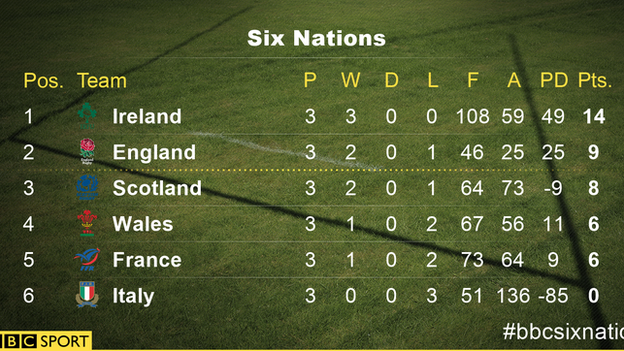
To Dublin next. Ireland's team is a formidable thing, their home record as big and as proud as Scotland's is at Murrayfield. They're looking for the fourth piece in a Grand Slam jigsaw and they, like us all, will wonder what version of Scotland will turn up.
Saturday was an 80 minutes when Scotland regained pride on the world stage and reinforced their reputation as a team to fear at Murrayfield, not just in the peace-time rugby of autumn Tests and summer tours but in the wars that must be won in the Six Nations. They can do it at home, but can they do it away from home?
Among the heavy hitters of the Six Nations, away wins are getting as rare as the Sumatran Rhino and the Snub-Nosed Monkey. Last season, Ireland lost in Scotland who lost in England who lost in Ireland who lost in Wales who lost in Scotland who lost in France. This season, Scotland lost in Wales who lost in England who lost in Scotland.
The challenge will be even greater on the road in Ireland. The beauty of it all, though, is that Scotland are in the hunt at the top rather than tailed-off at the bottom. They shook up world rugby on Saturday. The task now is to do it all over again.
- Published24 February 2018
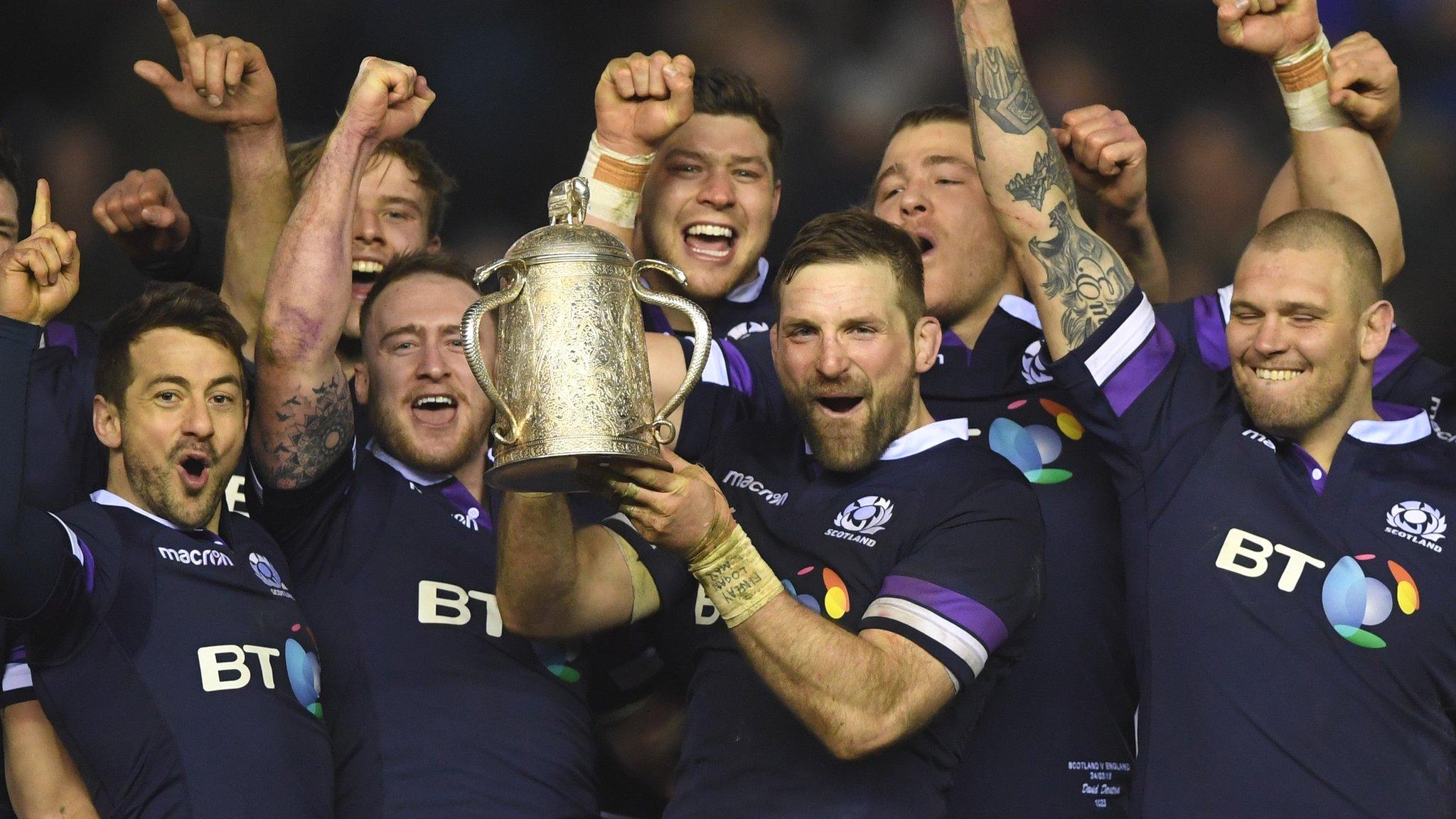
- Published24 February 2018
- Published24 February 2018
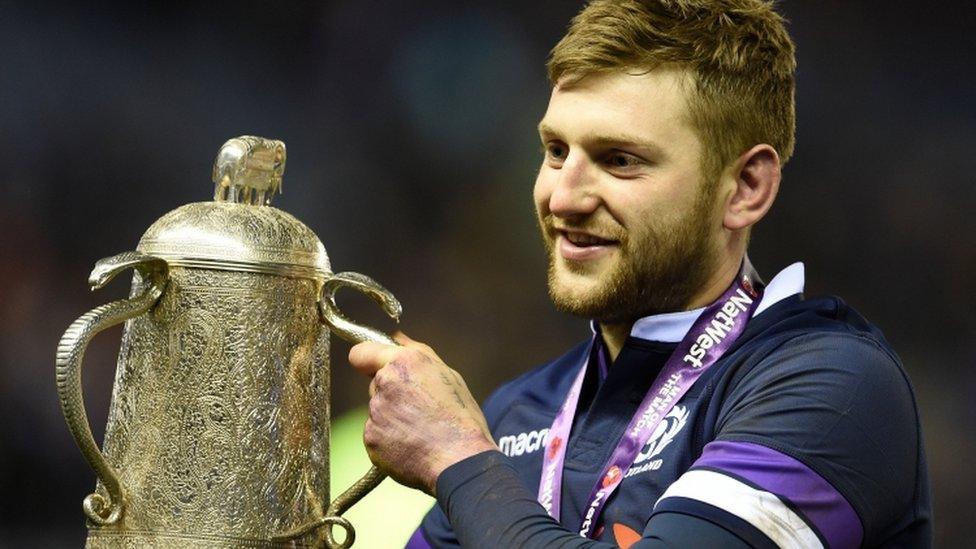
- Published24 February 2018
